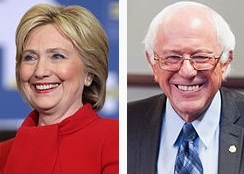In this election cycle of 2016, both presumptive nominees have been known quantities for a long time, at least, for the people who have been paying attention to the politics and society. But there are many different opinions on both them at the moment in the general public as the election is coming closer and taking a definitive shape. One from lifelong public service, the other from business and entertainment. With a little bit of critical thinking, it shouldn't be that difficult to nail them down as to who, what, and how they are. It is, also, the job of the journalists and every thinking people to understand who they are and what shaped them. One indisputable fact is that there are many strong stubborn opinions on them that are polar opposites.
It is true that both of them are complicated and nuanced, but,then, most people are complicated and nuanced, and different people may see(or want to see) a part of them. Not the whole person. The question is why it is so. It is granted that all of us fall into that trap in our everyday life with everybody we meet. When it comes to politicians and the presumed leaders, the tendency gets greatly exaggerated. There are so much misinformation, disinformation, and conspiracy theories presented in a very emotional way that it is very easy to get confused, while so sure of the opinion they have adopted indiscriminatedly, without realizing it.

In this election cycle, the focus of interest and question lies more on the people and the process than the candidates, themselves. This time around, the electorates are not easily classified in the sense of some segment supporting either Donald or Bernie but not Hillary. The high unfavorability of Hillary Clinton in the polls since she announced her candidacy is very interesting and could explain much about culture and politics in the U.S.A. It is as if some people are responding like the Pavlov's dogs when Hillary's name is mentioned with presidential ambition. Human psychology seems complicated and twisted, and, yet, really? Some segment of the people are responding to Donald's few, limited words very predictably.
One of the way the electorates are analyzed and classified is the identity politics. Class, gender, race, ethnicity, religion, education, and geography are some of the categories of the identity politics. It seems the U.S. Politics is ready to move beyond the usual identity politics, while it is still very strong and overwhelming. The question of this election is by how much. And that is why the focus of this election is more on the electorates than the candidates. I like to quote Jasbir Puar who was quoted by Nathan Heller of The New Yorker,5/30/16, in the article, 'The Big Easy.' "The Rutgers scholar Jasbir Puar charges that intersectionality posits people whose attributes--race, class, gender, etc.-- are separable analytics, like Legos that can be snapped apart, when in truth most identities operate more like the night sky: we see meaningful shapes by picking out some stars and ignoring others, and these imagined pictures can change all the time."
Another quote in the same article is the Audre Lorde quote. "There's no such thing as a single-issue struggle because we do not live single-issue lives."
The candidates have not much mystery left at this point. It is the complicated and nuanced, yet, very simple electorates and their perceptions and projections on the candidates that is going to be most fascinating.

